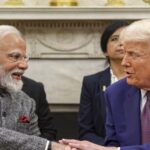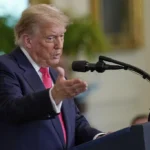
Key Highlights
- Former President Donald Trump announced 25% tariffs on goods from Mexico and Canada, with higher rates targeting China.
- Critics warn these tariffs could lead to economic retaliation and increased costs for U.S. consumers.
- Debate among Republicans reveals differing views on the potential impact of the tariffs and the broader trade war.
The Plan: Tariffs Across the Board
Donald Trump’s latest announcement promises sweeping tariffs on imports, including a 25% rate for goods from Mexico and Canada and even steeper rates for China. His campaign trail rhetoric centered on protecting American industries and reducing trade deficits, and now he’s aiming to deliver.
While some Republicans, like Mike Dubke, see this as a bold move and a warning shot to trading partners, others, like Ana Navarro, are skeptical about its implications for both international relations and domestic consumers.
The Impact on Consumers
Navarro pointed out a critical economic reality: tariffs are essentially taxes on imported goods, costs that are passed on to consumers.
- Rising Prices: Essentials such as groceries, cars, and housing materials are likely to see price hikes.
- Economic Blowback: Navarro emphasized that leaders like Mexico’s President Andrés Manuel López Obrador, Canada’s Justin Trudeau, and China’s Xi Jinping will not remain passive. Retaliatory tariffs could harm American exporters, escalating into a trade war.
- Misconceptions: Trump’s narrative that foreign governments will absorb the costs of tariffs is misleading, Navarro argued, as the financial burden falls on U.S. households and businesses.
Republican Divide on Trade Policy
Trump’s tariff strategy highlights a divide within the Republican Party:
- Pro-Tariff Faction: Supporters argue that aggressive measures are necessary to correct trade imbalances and protect American jobs.
- Free Trade Advocates: Many conservatives traditionally oppose tariffs, favoring free trade agreements and fearing economic disruptions from trade wars.
Navarro’s warning underscores this tension, noting that trade policies based on “bluster without detail” could lead to unintended consequences for the U.S. economy.
Conclusion: High Stakes in Global Trade
As Trump pushes forward with his tariff plans, the stakes are high for both the U.S. economy and its global trade relationships. Critics caution that the policy may ignite a cycle of retaliation, raising costs for Americans while straining diplomatic ties. Whether this strategy will yield long-term gains or backfire remains to be seen, but the immediate risks to consumers and industries are clear.




































Leave a Reply